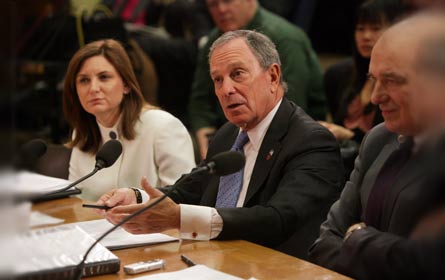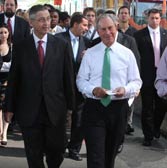
Some legislators call him the 63rd senator or the 151st assemblyman. "His vote has much more impact than that of this lone senator," said Sen. Bill Perkins.
Perkins was referring to New York City Mayor Michael Bloomberg. Whether it springs from his generous sponsoring of Senate Republicans, the weight his opinion carries with the public or the spite some lawmakers feel toward him, Bloomberg has the ability to drastically affect the direction of discourse in Albany.
With so many city issues in the hands of the state legislature, Bloomberg has made his influence felt, assisted by the staff of his Albany office as well as his deputy mayors. This year, though, Bloomberg seems to have stepped back to let his surrogates speak for him, in an evident effort to make the debate less about him and more about the issues. He reduced his combative moments in the capital and focused on the big fight-- renewing mayoral control of schools.
Supporters say he learned from the debacle of his 2008 push for congestion pricing, which ended in defeat for the mayor amid a chorus of verbal attacks from the legislature featuring such epithets as "elitist," "out of touch," and "bully!"
This year, despite the will-they-or-won't-they drama over the Senate's vote on mayoral control of city schools and the ugly spats that took place between the mayor and a group of Senate Democrats, Bloomberg won some important battles with the legislature.
"I don't think the mayor has learned anything, except that he shouldn't speak for himself or come up to Albany," said Sen. Kevin Parker, one of the mayor's harshest critics. "He thinks he is better than us and he can't hide his contempt for us at all, so he tried a different tactic."
Authority Over Authorities

With the legislature out of session, Bloomberg is still affecting the fate of legislation. He is currently wielding his influence to pressure Gov. David Paterson to veto the Public Authorities Reform Act of 2009.
The bill is designed to make public authorities such as the Metropolitan Transportation Authority and the Empire State Development Corp. more efficient, less subject to cronyism and more accountable, and to reduce the influence of lobbyists and politicians. The bill would create an independent budget office that can investigate authorities and monitor their spending. It would also have the state comptroller review contracts awarded by authorities that are worth more than $1 million.
The bill took shape over a period of years, put together as a result of hearings, debates and public outcry. It has been praised by the media, political experts, legislators and good government groups alike. Some observers joked the bill was one of the few good pieces of legislation the Senate passed this year.
Supporters of the bill say only two people seem to have any real problems with the measure -- Gov. David Paterson and Mayor Michael Bloomberg. And they say Paterson's objections only surfaced in recent weeks.
Bloomberg has argued the bill would hurt development projects, because it mandates that authorities must sell any land they own at the market rate. The Paterson administration has objected to the provision that would mandate the state comptroller review contracts worth more than $1 million, saying it would overburden the comptroller.
Sen. Liz Krueger, a co-sponsor of the bill, said that she finds some of the points brought up by Bloomberg and Paterson perfectly "reasonable," but still thinks "the governor should sign the bill into law." Krueger and other supporters of the bill believe a good course of action would be to address concerns about the bill by passing chapter amendments after the bill becomes law.
Making a Fuss
Krueger said neither the governor's staff or the mayor's Albany lobbyists approached her with their concerns prior to the bill's passage.
"They didn't raise them before we took a vote. I never heard opposition from the city. So I am confused, because they have brought lots of things to my attention in the past. The mayor is not a shy man."
Krueger speculates that perhaps Bloomberg's staff was focused on mayoral control and not the authorities.

Michelle Goldstein, the director of the mayor's office of state legislative affairs, said the city has long made its objections to parts of the bill known. "The city's opposition to particular provisions in this bill is not new and is a matter of public record. As currently written, this legislation would negatively impact the city's ability to pursue its economic development goals and actually reduces authorities' accountability."
In 2008, Bloomberg spokesperson Farrell Sklerov was quoted in the New York Times as saying, "The city has serious concerns that this proposal would ultimately reduce public accountability and hamper economic development."
Bloomberg aides say a number of legislators want to distract attention from the real issues by trying to make the story about the mayor and his personality.
For their part, some senators think that Bloomberg wanted to avoid an ugly battle with the Senate over the public authorities so instead focused his efforts on the relatively weak Paterson. They say that Bloomberg represents one of Paterson's few remaining allies and a powerful one at that. While these senators originally thought Paterson would sign the bill as a good government measure, they see the governor as having changed course only to keep himself in Bloomberg's good graces.
"Without a doubt there is no other influence that is significant other than the mayor's," said Perkins. "When has something this clearly good been stopped if not for purely selfish reasons?"
Brodsky agrees that Bloomberg's influence is more than apparent. "It is a matter of public record that [Bloomberg] is doing this. He is not doing this in a subtle way. It is all about power," said Brodsky.
Parker, however, says he isn't sure Paterson's stance is due to Bloomberg. "The governor is capable of making his own mistakes," he said.
It is still unclear what the governor will do, but the Bloomberg administration thinks a compromise could be reached easily if all sides sat down to talk.
Getting What He Wants
Compromise seems to have become a part of Bloomberg's Albany routine since his unyielding push for congestion pricing failed in Albany last year. Bloomberg made the fight for congestion pricing personal. He demanded things of legislators both publicly and privately and refused to compromise.
Following that defeat, Bloomberg has attempted to remove himself from the argument and instead focus on the issues with the help of grass roots movements and other surrogates. And this year Bloomberg basically won his biggest battles.
"In the last session we worked with the state legislature to reauthorize mayoral control of schools and approve the city's revenue package," said Goldstein. "We are hopeful that going forward we can work with the governor and the legislature on critical issues such as the creation of a Tier 5 pension plan for new employees."
Bloomberg has an interesting array of tools to help him get what he wants in Albany. Perhaps the most useful one is his wealth. For years Bloomberg has donated heavily to state Republicans, and the change in the control of the Senate hasn't stopped his generosity. His largesse has probably helped him keep Senate Republicans as a supportive voting bloc.
Bloomberg's relationship with Republicans can be a liability as well though. Some Democrats say that by supporting Republicans from rural districts Bloomberg funds people who have propagated the upstate-downstate divide and villainized New York City. As one source put it, "From a practical standpoint, it might not be the wisest investment for the mayor to keep lavishing donations on a minority conference that is openly hostile to the best interests of New York City."
On the Scene
Bloomberg's Office of State Legislative Affairs keeps him connected to the capital. New York is the only city that has a full time lobbying staff at the Capitol. The office is staffed with a director, an assistant director and four legislative liaisons.
The office circulates position papers, gives legislators information about how various measures might affect the city, and negotiates and participates in the creation of legislation. They also act as ears for Bloomberg to gauge how legislators are reacting to proposals.
Deputy Mayors Kevin Sheekey and Dennis Walcott have spent time in Albany lobbying for the mayor's big issues. This year Bloomberg visited Albany twice.
The Battles of 2009
This year started with the city facing major funding cuts in the state budget. Paterson proposed cutting millions of dollars of Aid and Incentives for Municipalities funding to New York City. Large cuts to education were also proposed. But the state restored the aid to municipalities, and the cuts to education were largely patched by federal stimulus money. Despite Bloomberg's contentious relationship with Democratic members of the Senate, the new Democratic majority and Assembly Speaker Sheldon Silver may well have helped Bloomberg stave off cuts. The Democratic leadership is mostly based in the city and did not want to see jobs lost across the city.
Then came the battle over the MTA rescue plan. While Bloomberg supported charging drivers for entering Manhattan -- after all he himself had proposed another version of it in his PlaNYC2030 -- the mayor was not publicly vocal about it. Many senators from the outer boroughs opposed the Ravitch plan, which would have put tolls on East River Bridges, and derailed it.
Some advocates on the other side complained that Bloomberg was absent from the debate. "You couldn't find the mayor saying anything about the MTA situation," said one senator, adding, "Maybe he was advised to stay quiet."
In the end, the legislature passed a watered-down plan that staved off high fare increases for straphangers but did not include bridge tolls. It was a defeat for Bloomberg, but because he had not been as out-front on the issue as he was on congestion pricing, it was a relatively quiet one.
School Fight
While the mayor's fight to retain control of schools got off to a shaky start partly because of legislators' antipathy toward schools Chancellor Joel Klein, things quickly turned around. Bloomberg had assistance in spreading his message from Learn NY, a pro-mayoral control group to which the mayor has denied ties but which received significant funding from Bloomberg's pal Bill Gates. This helped shape the image of grassroots support for mayoral control. He also had the megaphone provided him by the New York Post, which proudly led "the campaign" to renew mayoral control. Micah Lasher was hired on as the head lobbyist for the Department of Education.
Silver, who has butted heads with Bloomberg in the past, reached a deal to renew mayoral control through an Assembly bill that contained a few new measures designed to address criticism. There is quite a bit of speculation about how the two mended fences, but people who know are not talking.
When it came time for the Senate to act, things still seemed to be coming together for the mayor. Even while some legislators demanded a major overhaul of the system, negotiations between then Senate Majority Leader Malcolm Smith and Bloomberg's office seemed to be proceeding smoothly and the Senate seemed likely to pass a bill very similar to the Assembly's.
But then came the coup that plunged the Senate into deadlock. When Sen. John Sampson became leader of the Democratic conference, supporters of mayoral control began to worry. Sampson was an outspoken critic of mayoral control as it existed.
It wasn't until the city sales tax was voted down during a legally questionable session that it became clear what a hostile crowd Bloomberg would now face on mayoral control. Sources say senator blocked the tax increase that would allow the city to balance its budget simply to send a message to Bloomberg and to retain some leverage in negotiations over mayoral control.
Once the coup ended, the Senate did approve the hike in the city's sale tax. But there still was no agreement on mayoral control.Parker brought his Better Schools Act, which would have drastically curtailed the mayor's authority, to a vote. It failed but the bill's very existence was seen as an slap in the face to Bloomberg.
Then things really got ugly.
Some Democratic senators openly taunted Bloomberg, and, when asked at a press conference whether he would negotiate with the Senate, Bloomberg said he would not be Neville Chamberlain. Later, when asked if he was comparing the senators to Nazis, Bloomberg responded, "I certainly did." A spokesperson later claimed that Bloomberg had misheard the question.
A few days later, Sen. Pedro Espada told the press he would soon be having "'Pollo a la Bloomberg." Perkins accused the mayor of "treating us like we're some people on his plantation."
A number of senators seem to revel in their contempt for Bloomberg like children trying to impress each other by taunting the neighborhood dog.
It wasn't much later that a deal was announced, having been negotiated by other senators. It gave the Senate some of the concessions it was looking for but left mayoral control largely intact. Bloomberg had his control of schools renewed, and some of the more outspoken senators had had their chance to openly bash the mayor.
In a way, both sides got what they wanted.
Even though Bloomberg succeeded, the episode, along with Bloomberg's previous setbacks in the capital, made it clear that, in Albany, the mayor does not enjoy the seemingly boundless power that he has in the city. Up the Hudson, he still finds himself subject to the whims of the legislature. If Bloomberg wins a third term this year he will likely have to adjust his approach to Albany yet again -- as the 2010 elections may leave him with an entirely different playing field.




